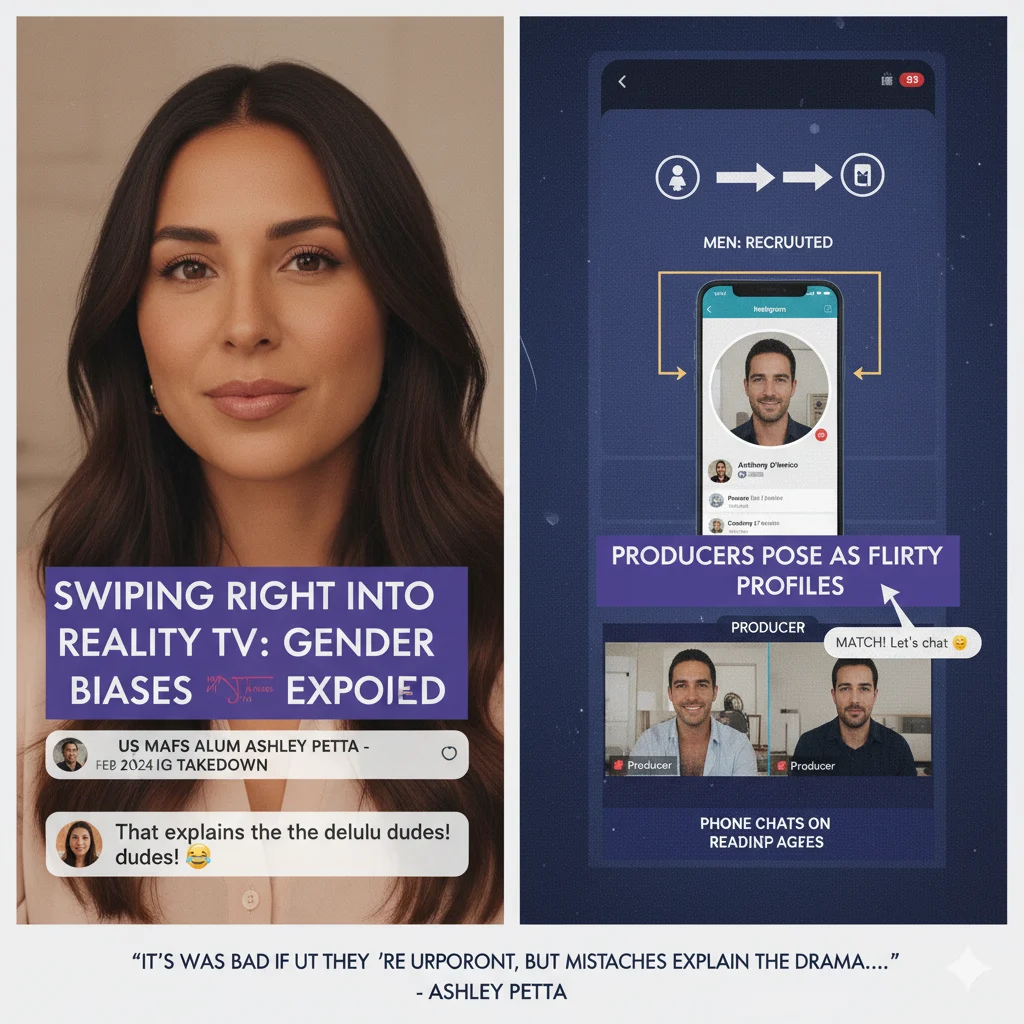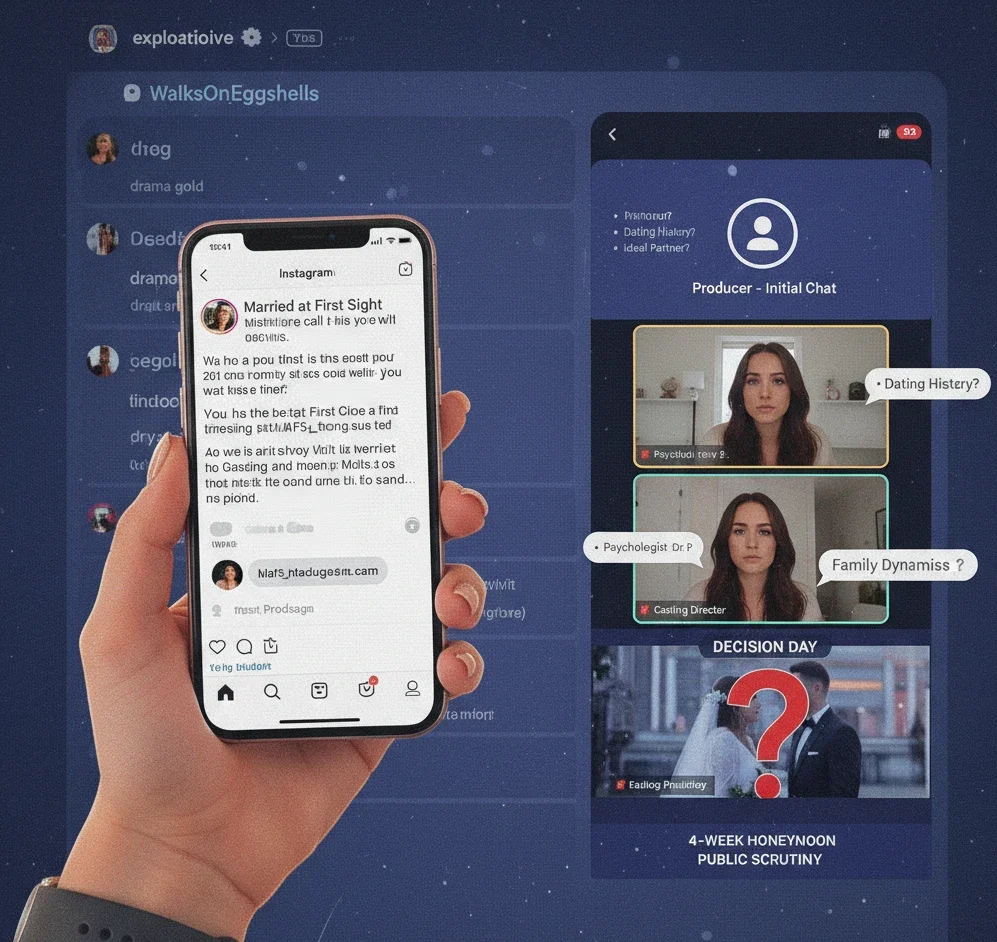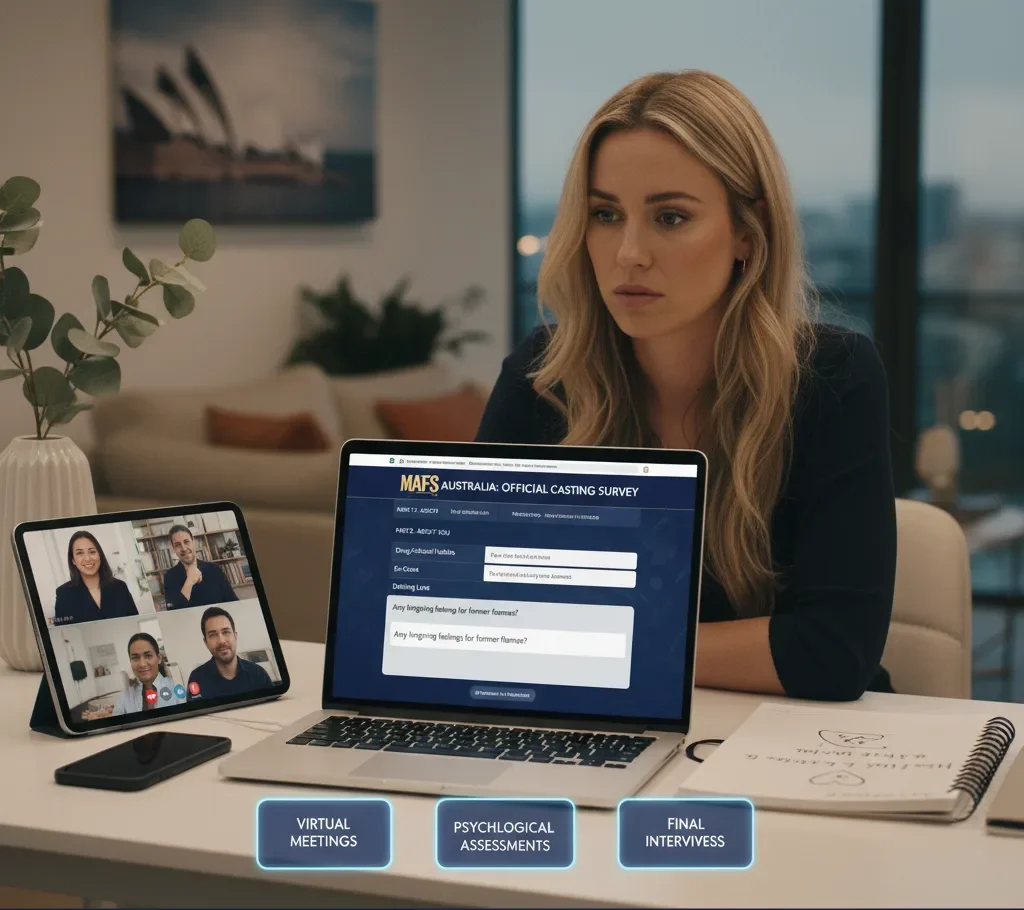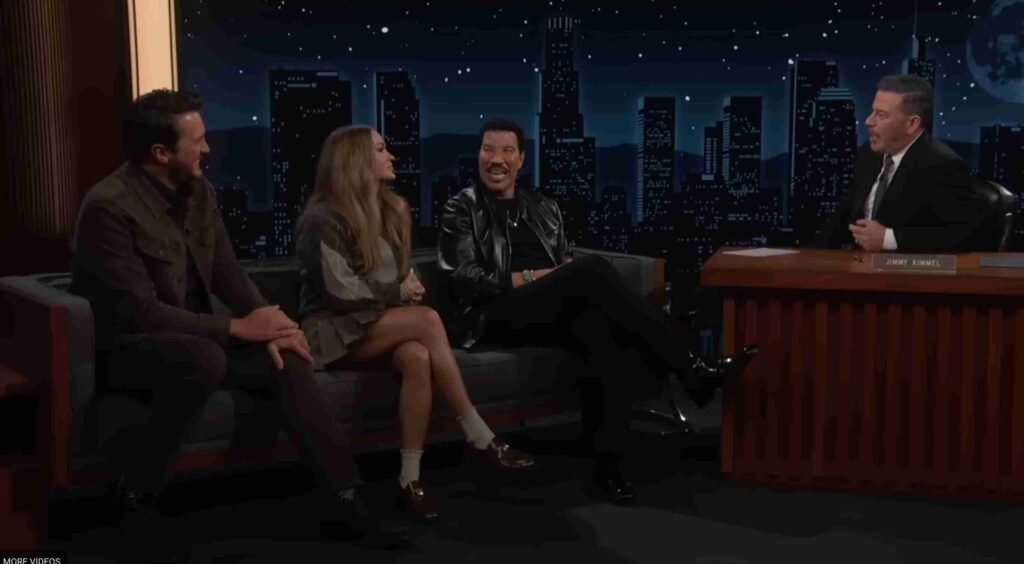Unpacking MAFS Casting Process: Real Audition Experiences & Reviews

In the high-stakes world of reality TV, few shows ignite as much curiosity—and controversy—as Married at First Sight (MAFS). With over a decade of episodes across versions in the US, Australia, and beyond, the series has paired hundreds of strangers at the altar, boasting a tantalizing premise: expert matchmaking leading to love at first sight.
Table of Contents
Yet, beneath the dramatic weddings and explosive dinner parties lies a lesser-known saga—the MAFS casting process. Only about 19% of couples endure long-term, prompting fans to wonder: What really happens during MAFS auditions? Do they foster genuine connections, or fuel scripted chaos?
This article dives into the MAFS casting process through three revealing case studies, blending US and Australian perspectives.
From unsolicited Instagram DMs to exhaustive questionnaires and sneaky dating app scouts, we’ll explore real MAFS audition experiences, participant feedback, and honest reviews.
These stories, drawn from public accounts as recent as 2024, highlight the thrill of potential matches alongside ethical pitfalls like invasive vetting and gender-biased recruitment.
Whether you’re a die-hard viewer or a curious single pondering an application, these insights offer a roadmap to the show’s secretive selection machine—and why it might be more “married at first swipe” than science.
The Social Media Scouting Game – Unexpected Recruitment in the US MAFS Casting Process
From Instagram DM to Decision Day: A Reluctant Applicant’s Audition Experience
Picture this: You’re scrolling Instagram, laughing off a friend’s tag in a Married at First Sight casting call post, when—ding—a direct message from a producer lands in your inbox.

This wasn’t a scripted fairy tale; it was the reality for “WalksOnEggshells,” a 32-year-old woman who shared her 2021 brush with the US MAFS casting process on Reddit’s r/datingoverthirty. What started as a joke snowballed into a whirlwind of screenings, exposing the proactive, digital-first tactics producers use to snag “relatable” contestants.
The MAFS casting process kicked off with a casual 30-minute phone call the day after the DM. Producers probed her dating history—why past relationships fizzled, her ideal partner’s traits (think stable job, shared hobbies)—and even family dynamics.
“They wanted the full picture: emotional baggage, career stability, everything,” she recounted. No stone unturned: She was walked through the show’s blueprint, from psychological matching by experts like Dr. Pepper Schwartz to the legally binding marriage, four-week honeymoon, and high-stakes Decision Day.
Emboldened (or intrigued), WalksOnEggshells advanced to a Zoom interview the following week. Here, the stakes ratcheted up with deeper dives into her readiness for commitment and vulnerability. Feedback from her experience?
“It felt low-risk at first—like a fun therapy session—but invasive. They’re hunting for drama gold.” Yet, she bowed out before in-person evals, haunted by fears of public scrutiny. Past indiscretions, like an ex’s infidelity scandal, could resurface under the show’s glare, turning her private life into tabloid fodder.
Reviews from the Reddit thread echoed her ambivalence. One commenter, a dating show vet, slammed the MAFS audition experience as “exploitative,” citing manipulative editing that warps participants into villains or victims.
Another insider pegged success rates at a dismal one lasting couple per season, questioning if the process truly vets for compatibility or just telegenic tension. Pros? It sparked rare self-reflection on why she’s single. Cons? The reputational roulette—once you’re in, good luck scrubbing the internet.
| What They Asked | Why It Matters in the MAFS Casting Process |
|---|---|
| Dating history & breakup reasons | Gauges emotional patterns for “scientific” matching |
| Job/income stability | Ensures cast diversity and logistical feasibility |
| Family dynamics & hobbies | Builds “relatable” profiles for viewer empathy |
| Show format buy-in | Filters out fame-seekers vs. genuine romantics |
This case underscores how the US MAFS casting process leans on social media for organic-feeling recruitment, but at what cost to privacy? It’s a far cry from traditional auditions, blending serendipity with scrutiny—and setting the stage for gender-specific twists we’ll unpack next.
The Deep-Dive Questionnaire – Tahnee Cook’s Raw Take on Australian MAFS Auditions
Three Months of Soul-Searching: Inside the MAFS Audition Experience Down Under

Down under, the MAFS casting process amps up the introspection, transforming a Friday-night whim into a three-month odyssey of self-examination. Tahnee Cook, a standout from Australia’s Season 10 in 2023, spilled the details in a candid 2025 ELLE Australia interview.
Applying via the official site on a lark, she was floored by a producer’s callback the very next Monday—launching her into virtual meetings, psych assessments, and a questionnaire that read like a relationship therapist’s dream (or nightmare).
At its core was the multi-stage survey, a beast that took days to conquer. Divided into three parts, it dissected her romantic blueprint:
- Your Future Partner: Physical and personality wishlists, plus reflections on past flops. Sample gem: “Name a celebrity crush.” (Cook went with Harry Styles and Michael B. Jordan—relatable!)
- About You: The raw underbelly—drug/alcohol habits, ex-count, love definitions, even “Have you dated anyone famous?” and lingering feelings for former flames.
- The Show: Commitment probes, like expectations for expert-led pairings.
Layered with producer interviews and psychological evals, the MAFS audition experience forced brutal honesty. “It was grueling but eye-opening,” Cook reflected. “You emerge knowing exactly what you want—and what you won’t tolerate.” She matched with Ollie Skelton, navigating on-screen sparks before an off-camera split, but credits the process with boosting her emotional IQ.
Feedback from Cook paints a nuanced review: Empowering for clarity, yet shadowed by production realities. Post-casting, contestants faced isolation—no off-camera mingling—and “frankenbiting,” where edited audio snippets twist words for drama.
“The waits are brutal—nine-hour dinner parties off-screen feel eternal,” she noted, debunking the scripted myth while admitting producers “nudge” storylines without full scripting.
| Pros of the Australian MAFS Casting Process | Cons from Cook’s Review |
|---|---|
| Fosters deep self-awareness & partner clarity | Invasive questions unearth painful histories |
| Rapid response builds excitement | Editing misrepresents intentions (e.g., frankenbiting) |
| Psych evals ensure maturity | Long timelines test patience; no socializing |
Australia’s larger casts (up to 10 couples) demand this rigorous filter, contrasting the US’s quicker digital hunts. Yet, both versions prioritize vulnerability—teasing the recruitment imbalances that plague American auditions.
The Hidden Hunt for Men – Dating App Tricks in the US MAFS Casting Process
Swiping Right into Reality TV: Gender Biases Exposed in MAFS Auditions

If women often chase the Married at First Sight dream via self-applications, men are more likely hunted—like digital prey on Tinder.
This revelation came courtesy of Season 5 alum Ashley Petta in her February 2024 Instagram Stories takedown of the US MAFS casting process.
Married to her recruited husband Anthony D’Amico (with whom she shares two kids and a decade of bliss), Petta called out the “unfit” Season 17 Denver cast, exposing how producers fill male slots through deceptive app scouting.
The MAFS audition experience diverges sharply by gender. Women like Petta apply organically through the Lifetime site, fueled by fandom or dating woes. Men? “Most aren’t tuning in for fun—they’re swiping for dates,” she explained.
Enter casting agents posing as flirty profiles; D’Amico bit when he matched with one, only to pivot to producer calls. Vetting mirrors applicants: Phone chats on readiness, Zoom deep-dives into histories. But recruits might miss the gravity, leading to “gaps” in cast chemistry.
Petta’s feedback is pragmatic: “It’s not inherently bad if they’re upfront, but mismatches explain the drama—like Season 17’s dropouts.”
Her review highlights risks: Under-vetted men amplify toxicity, from abuse allegations to quick exits. Fans piled on in comments—”That explains the delulu dudes!”—demanding fairer criteria amid calls for better background checks.
| Organic (Women) Path | Recruited (Men) Path |
|---|---|
| Website submission; self-motivated | Tinder/DM scouting; surprise pivot |
| Full format briefing early | Potential consent gaps; rushed buy-in |
| High emotional investment | Drama potential from mismatched expectations |
This tactic keeps casts balanced but spotlights inequities—women opt in for love, men for unwitting fame—fueling broader critiques of the MAFS casting process.
Comparative Analysis: Common Threads and Red Flags in MAFS Audition Experiences
Feedback and Reviews: What the Cases Reveal About the Bigger Picture
Synthesizing these MAFS audition experiences uncovers a tapestry of innovation and unease. All three cases spotlight psychological vetting as the linchpin, from WalksOnEggshells’ Zoom probes to Cook’s surveys and Petta’s hybrid screenings.
Timelines vary—weeks for US recruitment, months for Australia—but drama-hunting unites them, prioritizing telegenic tension over foolproof matches.
| Aspect | Case Study 1 (Instagram Recruitment, US 2021) | Case Study 2 (Tahnee Cook, Australia 2023) | Case Study 3 (Male Recruitment, US 2024) |
|---|---|---|---|
| Entry Method | Social media DM | Online application | Dating app scouting |
| Duration | Weeks (initial) | 3 months | Varies; recruitment-focused |
| Key Challenge | Exposure/privacy fears | Emotional introspection | Informed consent & gender bias |
| Feedback Highlight | “Low-risk but invasive” | “Transformative yet grueling” | “Explains mismatches—not all bad” |
| Review Score (Out of 5) | 3/5 (Self-reflection win, risk loss) | 4/5 (Clarity gain, editing con) | 2.5/5 (Fairness fail, balance pro) |
Aggregated feedback? Empowering for growth—participants like Cook hail the clarity—but exploitative in execution. Reviews decry low success (one enduring couple per season), ethical lapses (consent, editing), and biases favoring spectacle. As 2026 calls loom for cities like Austin, these stories urge reform: More transparency, less trickery.
Conclusion
From Instagram surprises to questionnaire marathons and app ambushes, the MAFS casting process is a rollercoaster of revelation and reservation.
These case studies—WalksOnEggshells’ close call, Tahnee Cook’s soul-baring journey, and Ashley Petta’s insider exposé—illuminate MAFS audition experiences that promise love but deliver scrutiny. Feedback praises the self-discovery; reviews warn of the wreckage, from twisted edits to uneven recruitment.
Aspiring alums, tread thoughtfully: The experts may match you, but the spotlight unmakes as many as it makes. As MAFS evolves—hello, potential 2026 twists—share your take below. What’s your review of the MAFS casting process? Ready to say “I do” to the unknown?




